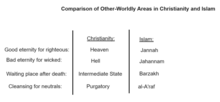
The afterlife or life after death is a purported existence in which the essential part of an individual's stream of consciousness or identity continues to exist after the death of their physical body. The surviving essential aspect varies between belief systems; it may be some partial element, or the entire soul or spirit, which carries with it one's personal identity.

In Abrahamic religions, the Garden of Eden or Garden of God, also called the Terrestrial Paradise, is the biblical paradise described in Genesis 2–3 and Ezekiel 28 and 31.

Heaven, or the heavens, is a common religious cosmological or transcendent supernatural place where beings such as deities, angels, souls, saints, or venerated ancestors are said to originate, be enthroned, or reside. According to the beliefs of some religions, heavenly beings can descend to Earth or incarnate and earthly beings can ascend to Heaven in the afterlife or, in exceptional cases, enter Heaven without dying.
Islamic eschatology is a field of study in Islam concerning future events that would happen in the end times. It is primarily based on sources from the Quran and Sunnah. Aspects from this field of study include the signs of the final age, the destruction of the universe and Judgement Day.

In Catholic theology, Limbo is the afterlife condition of those who die in original sin without being assigned to the Hell of the Damned. However, it has become the general term to refer to nothing between time and space in general. Medieval theologians of Western Europe described the underworld as divided into three distinct parts: Hell of the Damned, Limbo of the Fathers or Patriarchs, and Limbo of the Infants. The Limbo of the Fathers is an official doctrine of the Catholic Church, but the Limbo of the Infants is not. The concept of Limbo comes from the idea that, in the case of Limbo of the Fathers, good people were not able to achieve heaven just because they were born before the birth of Jesus Christ. This is also true for Limbo of the Infants in that simply because a child died before baptism, does not mean they deserve punishment, though they cannot achieve salvation.

The Divine Comedy is an Italian narrative poem by Dante Alighieri, begun c. 1308 and completed around 1321, shortly before the author's death. It is widely considered the pre-eminent work in Italian literature and one of the greatest works of Western literature. The poem's imaginative vision of the afterlife is representative of the medieval worldview as it existed in the Western Church by the 14th century. It helped establish the Tuscan language, in which it is written, as the standardized Italian language. It is divided into three parts: Inferno, Purgatorio, and Paradiso.

In religion, paradise is a place of everlasting happiness, delight, and bliss. Paradisiacal notions are often laden with pastoral imagery, and may be cosmogonical, eschatological, or both, often contrasted with the miseries of human civilization: in paradise there is only peace, prosperity, and happiness. Paradise is a place of contentment, a land of luxury and fulfillment containing ever-lasting bliss. Paradise is often described as a "higher place", the holiest place, in contrast to this world, or underworlds such as Hell.

The Last Judgment is a concept found across the Abrahamic religions and the Frashokereti of Zoroastrianism.
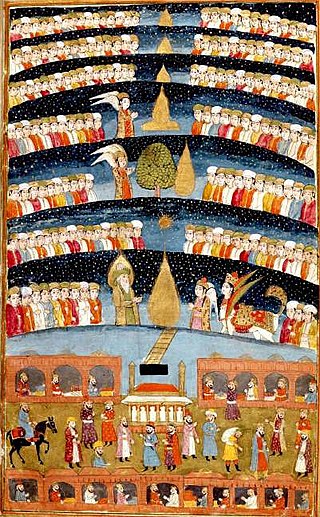
In Islam, Jannah is the final and permanent abode of the righteous. According to one count, the word appears 147 times in the Qur'an. Belief in the afterlife is one of the six articles of faith in Sunni and Twelver Shi'ism and is a place in which "believers" (Mumin) will enjoy pleasure, while the unbelievers (Kafir) will suffer in Jahannam. Both Jannah and Jahannam are believed to have several levels. In the case of Jannah, the higher levels are more desirable, and in the case of Jahannam, the lower levels have a higher level of punishments — in Jannah the higher the prestige and pleasure, in Jahannam the severity of the suffering. The afterlife experiences are described as physical, psychic and spiritual.

In Islam, Jahannam is the place of punishment for evildoers in the afterlife, or hell. This notion is an integral part of Islamic theology, and has occupied an important place in the Muslim belief. It is often called by the proper name Jahannam. However, "Jahannam" is simultaneously a term specifically for the uppermost layer of Hell.
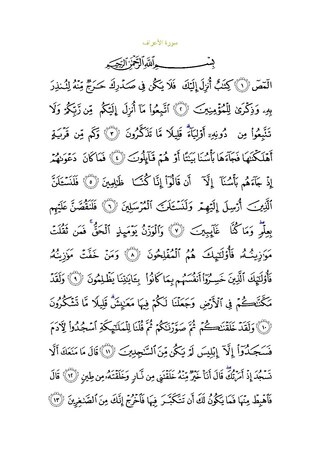
Al-Araf is the 7th chapter (sūrah) of the Qur'an, with 206 verses (āyāt). Regarding the timing and contextual background of the revelation, it is a "Meccan surah", which means it was revealed before the Hijra.
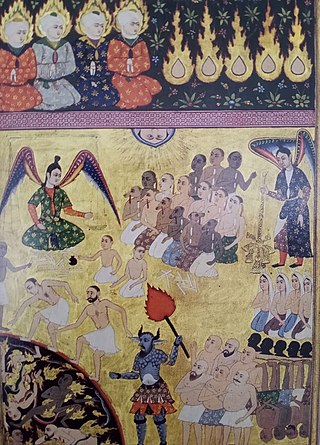
As-Sirāt is, according to Islam, the bridge over which every person must pass on the Yawm al-Qiyamah in order to enter Jannah.
Barzakh is an Arabic word meaning "obstacle", "hindrance", "separation", or "barrier". In Islam, it denotes a place separating the living from the hereafter or a phase/"stage" between an individual's death and their resurrection in "the Hereafter". It is also considered as a place where souls rest until the day of judgement. It bears resemblance to the intermediate state in Christianity.
al-Ākhirah is an Arabic term for "the Hereafter".

In religion and folklore, hell is a location or state in the afterlife in which souls are subjected to punitive suffering, most often through torture, as punishment after death. Religions with a linear divine history often depict hells as eternal destinations, the biggest examples of which are Christianity and Islam, whereas religions with reincarnation usually depict a hell as an intermediary period between incarnations, as is the case in the Indian religions. Religions typically locate hell in another dimension or under Earth's surface. Other afterlife destinations include heaven, paradise, purgatory, limbo, and the underworld.
The realm of Malakut, also known as Hurqalya or Huralya, is a proposed invisible realm of medieval Islamic cosmology.

In some forms of Christianity, the intermediate state or interim state is a person's existence between death and the universal resurrection. In addition, there are beliefs in a particular judgment right after death and a general judgment or last judgment after the resurrection. It bears resemblance to the Barzakh in Islam.
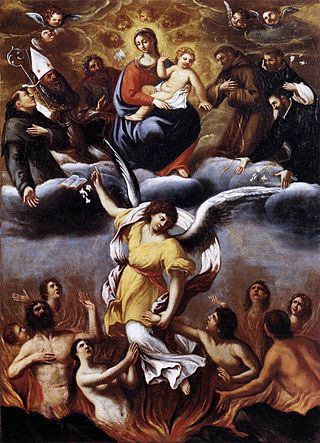
Purgatory is a passing intermediate state after physical death for purifying or purging a soul. A common analogy is dross being removed from gold in a furnace.

Judgement in an afterlife, in which one's deeds and characteristics in life determine either punishment or reward, is a central theme of many religions. Almost all religions are greatly devoted to the afterlife, emphasizing that what you do in your current life affects what happens to you after death.
In Islam, "the promise and threat" of Judgement Day, is when "all bodies will be resurrected" from the dead, and "all people" are "called to account" for their deeds and their faith during their life on Earth. It has been called "the dominant message" of the holy book of Islam, the Quran, and resurrection and judgement the two themes "central to the understanding of Islamic eschatology." Judgement Day is considered a fundamental tenet of faith by all Muslims, and one of the six articles of Islamic faith.

